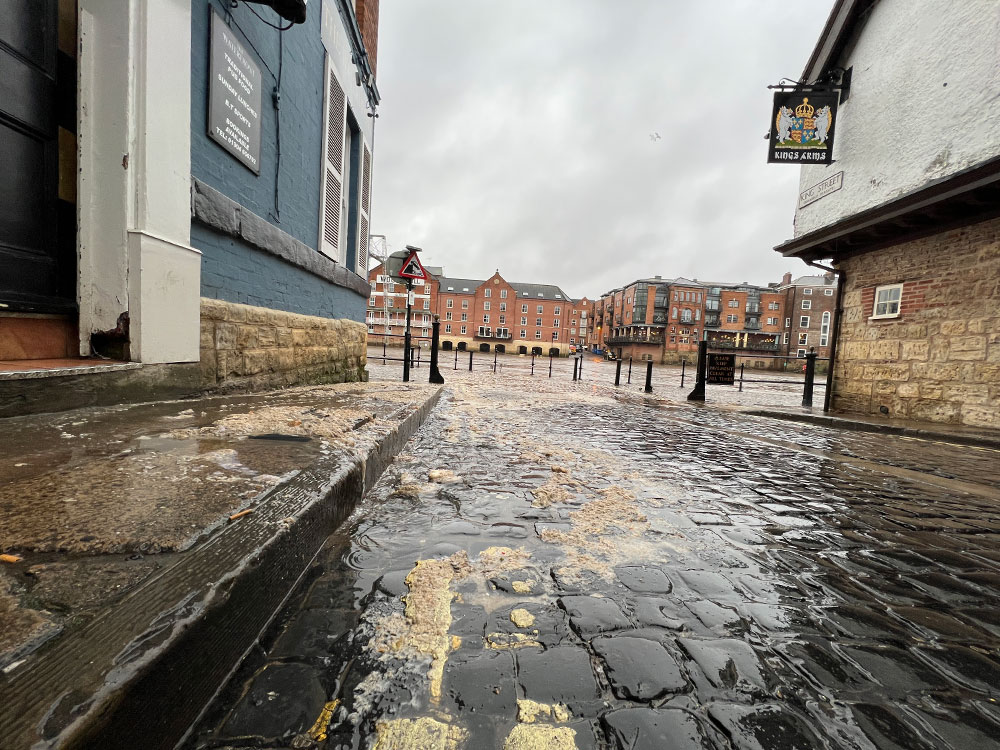Storm overflows dumped sewage into the River Ouse in York for more than 11,000 hours in 2023, more than double the previous year, figures show.
Data released today (Wednesday) show that the overflows – meant to be used as a last resort – spilt filth into the Ouse 900 times last year.
And that’s just for the stretch of water running through the city centre, from Millennium Bridge to Water End.
YorkMix has crunched the data, published by the Environment Agency.
We found the number of sewage spillages on this section of the Ouse alone were up 70% from 528 in 2022.
And the number of hours of spillages – from 4,806 in 2022 to 11,263 in 2023 – was up by 134%.
Our panel below shows all the sewage discharges into the Ouse in the city centre.
Yorkshire Water has the third highest average number of sewage spills per storm overflow among water companies in England.
The company said today it was disappointed by the figures; that the increase was due to very wet weather; and that it was investing in improvements. You can see its full statement below.

York resident Michael Neal lives by the river and has been horrified by the regular sight of sewage floating on the water under Ouse Bridge and through the city centre.
He said: “It is an obscenity in the 21st century to see human effluent going down the river.
“The fact that we can’t dispose of our own human waste in a sanitary fashion in this day and age is outrageous”
Michael also criticised Yorkshire Water for blaming excess rainfall for the problem. He said surface water caused by rain was required to flush the old-fashioned sewage system in the city centre.
Without rain, the system wouldn’t work. “You can’t then blame the rain when it goes wrong,” he said.
Nationwide, there were 464,056 spills in 2023, up 54% from 301,091 in 2022, which the Environment Agency said was partly due to England experiencing its sixth-wettest year on record.
York sewage overflows into the Ouse 2023
The water companies say they want to triple investment to £10 billion over the period 2025-2030 to tackle the problem, which would be paid for through consumer bills.
But clean water campaigner Feargal Sharkey told BBC Radio 4’s World At One programme: “The truth is if anybody is going to be paying for this, any investment at this point needs to be made out of shareholders’ pockets and the public should not put another penny of their money, because we do not want to pay twice for something we have already paid for and didn’t get.”
Shadow environment secretary Steve Reed said water company bosses should not be allowed bonuses for “this level of failure”.
What Yorkshire Water said

A Yorkshire Water spokesperson said: “We are committed to improving our region’s rivers and were disappointed about the number of discharges in 2023.
“This increase is due to the wet weather experienced in the twelve-month period, which included 11 named storms.
“The weather experienced in the region in 2023 included a very wet summer and prolonged heavy rainfall towards the end of the year resulting in groundwater infiltration into the sewer network.
“Met Office statistics show 1178mm of rainfall in our area in 2023, the highest level since 2013 and with the second half of the year one of the wettest on record.
“The Met Office named 2023 the sixth wettest year since its records began in 1836. Overflows operate during prolonged or heavy rainfall and multiple storms in close succession can lead to increased discharges due to the storm capacity being used up.
“Our teams worked hard throughout 2023 to reduce discharges as part of our commitment to improve the operation of our network.
“As a result, our modelling indicates investment in our network and changes to our operations since 2021 equate to an improvement of 12,980 discharges when normalised against rainfall.
“Nevertheless, we know there is more to do, and we are making headway with a £180m programme to reduce discharges across the region by April 2025.
“Work is in progress on 62 projects, including in York and surrounding areas, that will reduce discharges from some of the most frequently operating overflows, with more to follow later in the year.
“This is just the start of a long-term programme to reduce the impact of wastewater on the region’s watercourses and we have submitted plans to Ofwat that outline a further £1.19bn investment in overflow reduction between 2025 and 2030.”
